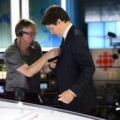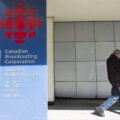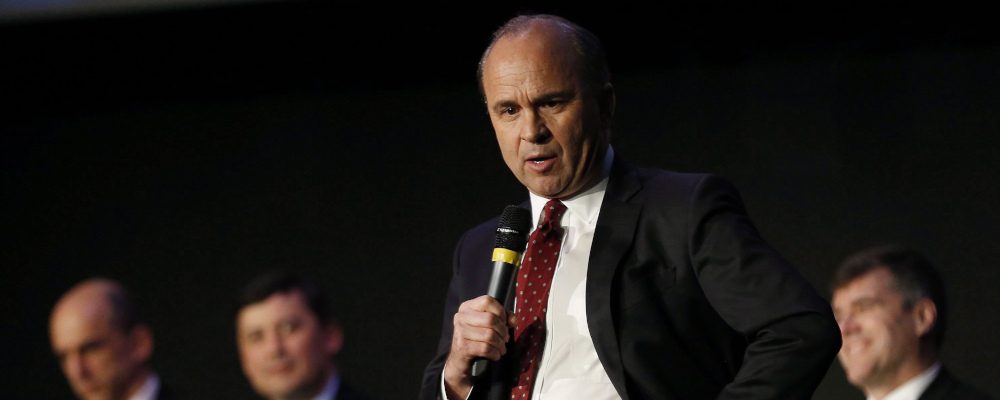When I first heard about the Centre Ice Conservatives, I had several reactions in quick succession.
My first thought was that it’s a curious name. Much of the game of hockey is played at or near centre ice but, as Luke Smith noted in these pages (and with apologies to Steve Mason), you don’t usually score from there. In fact, the space between the two blue lines is so far from the goal that another name for it is the “neutral zone,” which is not a place anyone in politics should ever aspire to be. You can’t care about politics and be neutral on policy.
More charitably, I thought that it’s never a bad thing when people are talking about policy, even prepared to label themselves publicly as centrists. There should be a place for everyone in Canadian politics, including that dwindling number of Canadians who open the Globe and Mail editorial page each morning and, between sips of lukewarm coffee—not too hot; not too cold—nod to themselves and think, “yes, that is what I believe too. That is exactly what I believe.”
My last thought was that the combination of “Centre Ice” and “Conservative” creates an inherent and probably irresolvable tension. If pushed to choose, would these folks opt for being conservative, or being in the centre—which, in politics, depends not on where you want to be but where other people are. Especially after Justin Trudeau has yanked the reins of the Liberal Party hard to the left on social policy, economic policy, and foreign policy, how far left can you move to occupy the centre and still reasonably call yourself conservative?
To their credit, most of the attendees at the Centre Ice Conservatives’ conference in Edmonton last week are not neutral on policy, and some of them have quite strong and even conservative views. I didn’t follow the conference’s proceedings, but I am familiar with most of the speakers and, among the political dilletantes and journalists, there were some serious public policy thinkers. An agenda that tried to combine their views would, however, be rather eccentric.
Brian Lee Crowley and Dominic Cardy, for example, have been admirably hawkish on the Chinese regime’s threat to Canada, to Western stability, and (not least) to its own people. Even more so than the last CPC platform, which was (wrongly) criticized as being immoderately anti-China. Crowley has also opposed transgender participation in women’s sports and the practice of accepting gender self-identification for purposes of incarceration—topics that receive mainstream attention in the United Kingdom and the United States, but almost none in Canada. He also supports reforming Canada’s health care system by adding private delivery, choice, and means-tested co-pays to bring us in line with our European peer countries.
Jack Mintz, one of Canada’s most distinguished economists, has recently called for a “tax revolt” (really, a demand a reduction in overall taxes of about $70 billion—not nothing, but hardly the Peasant’s Revolt the headline might suggest). He has also supported school vouchers, income splitting, and phasing out supply management: all mainstream economic policies, but political taboos in Canada.
Andrew Coyne also opposes supply management (he’s called it a “truly hideous policy”) and has been critical of Canada’s ongoing experiment with Medical Assistance in Dying. (Update: it’s not going well.) He has also pointed out that Canada’s lack of any legal restrictions on abortion is “objectively extreme,” and supports a democratic debate on what restrictions, if any, should be imposed.
Centre Ice co-founder (and thus presumably the most tepidly moderate of the Goldilocks Gang), Rick Peterson, ran for the CPC leadership in 2017 on a platform that included a 15 percent flat tax and more competition and private insurance in health care. He also favours less independence for members of Parliament and the imposition of Liberal-style “iron discipline” by the party leader over caucus members.
Ironically, a political platform that combined all of these views would be much more radically disruptive of the status quo than any in recent Canadian history. It would be denounced, if not in whole then at least part by part, by the Canadian establishment as being not just beyond the centre ice of Canadian politics but far outside the arena. It would be labelled, dare I say it, extreme.
That doesn’t mean some of these ideas aren’t worthy, but it illustrates the problem with trying to reconcile good policy with a point on an arbitrary political spectrum: some good ideas are outside the Overton window, and some ideas are popular because they are inoffensively ineffectual. The Centre Ice Conservatives want to have it both ways: they insist that their ideas are bold and fresh … but also already well within the mainstream of either Canadian politics generally or its conservative wing (their writing is not consistent about which centre they want to fill).
It is a centrism that wants to be all things to all things centrist to all centrists. Sometimes it is defined as the thick centre of the public opinion bell curve (“[c]entrist positions … very likely reflect where the vast majority of Canadians see themselves”). Other times is a hazily-defined leadership quality (“Centrist leadership” is “being able to establish a position that balances competing and strident views from the outside, and brings them together with a focus and ability to rally a majority behind them”). And sometimes it is just a list of politicians whose only common trait seems to be the speaker’s personal admiration (Brian Mulroney and Stephen Harper; Brad Wall and Peter Mackay; Ralph Klein, Bill Davis and Francois Legault).
At one point, in his scrupulous concern not to stray too far in either direction, Peterson simultaneously complains that “[t]he Liberals have moved to the woke left and embraced the divisive practice of identity politics” while boasting that the Centre Icers support “diversity, equality and inclusion standards in business and all walks of life” (my emphasis). I suppose if you both oppose and support a policy, you’ve covered the large majority of Canadians’ position on the issue, but that isn’t centrism, it’s disorientation.
This is chimerical centrism. It is a “centrism” so variously and vaguely defined that it signifies nothing more than “the sort of things decent people like us believe.” Jack Mintz, who spoke at the conference, wrote that the spectre of Pierre Poilievre haunted the event like the ghost of Banquo at Macbeth’s table. I’m not surprised. The organizers want policies that are popular without being populist. It is a fine line, usually visible only to the beholder, but one you must constantly insist on lest anyone mistake your ideas for the sort of thing those other people believe. Freud called this the “narcissism of small differences.”
According to Mintz, the “[i]deas expressed by panelists included tax reform to broaden tax bases and lower rates, regulations and infrastructure enabling investment in both traditional and clean energy, balancing the budget and providing opportunities for skilled immigrants to achieve accreditation more quickly.” On foreign policy, speakers bemoaned “Canada’s loss of its middle power status as it has been shut out of security discussions amongst its allies” and agreed that “our own defense needs loom larger as a priority instead of leaving our security solely to the United States.”
But are any of those ideas really so different from what we know about Poilievre’s policy views, either as expressed during the leadership campaign, in his time in opposition, or as a member of Harper’s cabinet? Some Centre Icers talk as though the current CPC leadership race is a Manichean struggle for the soul of the party, but it sounds more like a struggle for its style. Or maybe for its social media feed.
Mintz again: “The most profound reaction of many conference participants seemed to be against the manner, style, and rhetoric of their opponents.” One speaker complained of “rage-filled diatribes.” Rage? Really? One can’t help but think that, in the case of at least some of the participants, the principal complaint is not that Poilievre is driving the CPC agenda but that they aren’t. If they listened more closely, they would find his message isn’t too different from theirs, just more effective.
The organizers of the Centre Ice Conservative conference have insisted, repeatedly, that they are not interested in starting a breakaway political party, even if Poilievre wins the CPC leadership. It is probably for the best. What would they offer that is so different? Tone-policing? An air of embarrassment about their potential voters? That’s not much to build on.
I suspect that, if Poilievre does win, most of the Centre Icers—and many of their policies—will find themselves back in the party fold. Though possibly not at the centre.
Recommended for You

Ben Eisen and Jake Fuss: Somebody tell Justin Trudeau and Doug Ford that the Santa Claus model of tax policy doesn’t work

Samuel Ragot and Daniel Béland: Poverty among persons with disabilities is a policy choice

The Weekly Wrap: Nostalgia is not a good enough reason to keep the CBC around

Harrison Lowman: Why conservatives despise the CBC, why they can’t wait to tear it to shreds, and why they have a point




